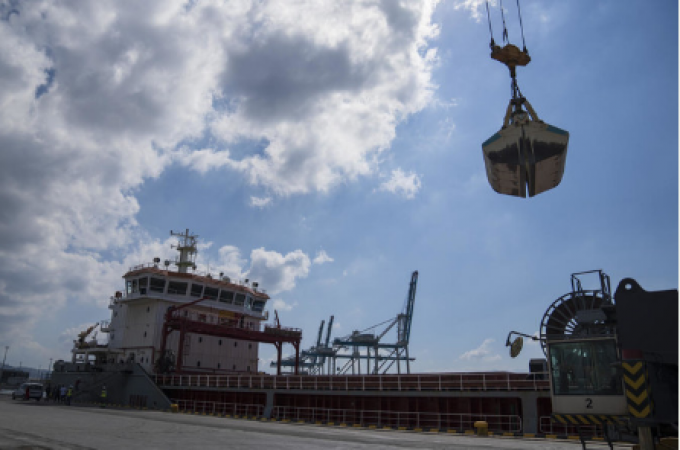
UNO: A day before Russia could withdraw from the agreement due to barriers to its grain and fertiliser exports, the last ship under a deal allowing the secure Black Sea export of Ukraine grain left a port in that country on Wednesday.
According to information provided by the UN, the DSM Capella departed the port of Chornomorsk with 30,000 tonnes of corn and was en route to Turkiye.
In July of last year, the United Nations and Turkiye mediated the Black Sea agreement for a preliminary period of 120 days to assist in addressing a global food crisis that has been made worse by Moscow's invasion of Ukraine, one of the top exporters of grains in the world.
Also Read: In a high-level corruption case, Ukraine detains the head of the Supreme Court
Moscow initially agreed to a 120-day extension of the Black Sea pact in November, but in March it consented to a 60-day extension, or until May 18, barring the fulfilment of a number of conditions relating to its own agricultural exports.
The UN also agreed to support Moscow with its own agricultural shipments for three years in order to persuade Moscow to permit Black Sea grain exports in July.
Regarding our portion of the agreement, there are still a lot of unanswered questions. According to Russian media, a decision must now be made, as stated by Kremlin spokesman Dmitry Peskov on Tuesday.
Last week, senior representatives from Russia, Ukraine, Turkey, and the UN gathered in Istanbul to talk about the Black Sea pact. On Tuesday, UN spokesman Stephane Dujarric stated: "Contacts are ongoing at various levels. Clearly, this is a delicate time.
Mevlut Cavusoglu, the foreign minister of Turkey, stated last week that he believed the agreement could be extended for at least two more months.
Also Read: Africa sends peacekeeping mission to Ukraine Ramaphosa, Russia
Although Western sanctions imposed after the February 2022 invasion of Ukraine do not apply to Russian exports of food and fertiliser, Moscow claims that restrictions on payments, logistics, and insurance have served as a barrier to shipments.
The Russian complaints were dismissed by the United States. Last week, Linda Thomas-Greenfield, the US ambassador to the UN, stated: "It is exporting grain and fertiliser at the same levels, if not higher, than before the full-scale invasion."
The Black Sea export agreement is carried out by representatives from Russia, Ukraine, Turkey, and the UN at the Joint Coordination Centre (JCC), which is located in Istanbul. They approve and examine ships. Since May 4, the JCC has not authorised any new vessels.
Before departing for a Ukrainian Black Sea port via a maritime humanitarian corridor to pick up their cargo and return to Turkish waters for a final inspection, authorised ships are inspected by JCC officials close to Turkiye.
Russia informed its JCC counterparts in a letter excerpt obtained by Reuters last month that it would not approve any new ships to participate in the Black Sea agreement unless the transits would be completed by May 18 — "the expected date of... closure."
After May 18, it was stated that this was done "to avoid commercial losses and prevent potential safety risks."
It seems unlikely that any ship owners or insurance firms would be willing to continue transporting Ukrainian grain exports if Russia does not heed this warning from Russia.
Under the terms of the Black Sea Agreement, 30.3 million tonnes of grain and food were exported from Ukraine, including 625,000 tonnes in World Food Programme vessels for relief efforts in Afghanistan, Ethiopia, Kenya, Somalia, and Yemen.